Bucatini cacio e pepe is a simple, classic peasant dish from Italy made with just five ingredients. This creamy decadent pasta uses sheep’s milk Pecorino Romano cheese along with starchy pasta cooking water to create an indulgent meal that’s both easy and economical.
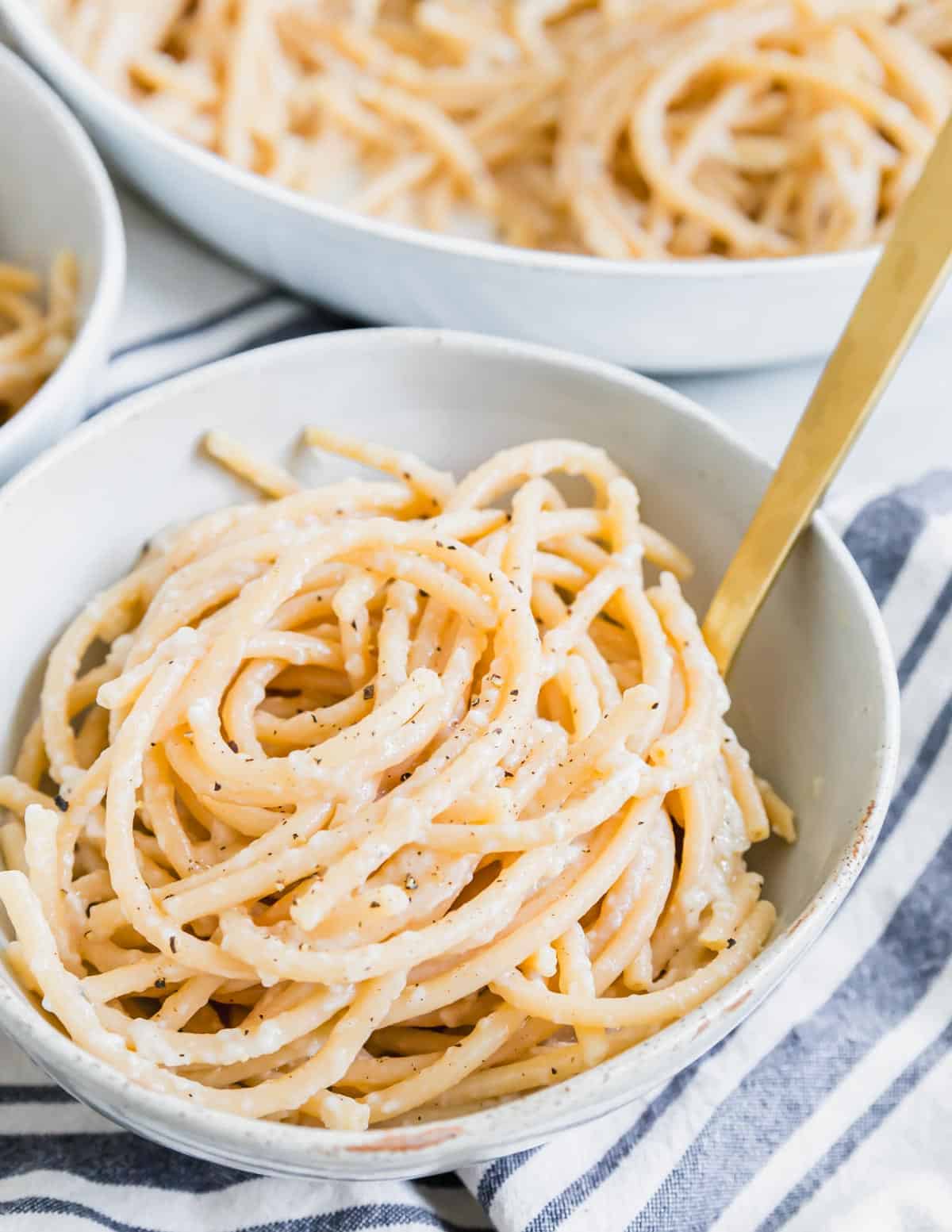
Cacio e pepe is like the poor man’s version of carbonara. If you’re someone that’s freaked out by assuming raw eggs will cook enough when tossed with hot pasta, it’s probably got a leg up on that recipe anyway.
This meal was originally created as a peasant dish in Italy. It uses such simple ingredients, the decadence of the final result will likely take you by surprise.
Bucatini is a fun choice for this classic pasta dish. It’s a thick noodle almost identical to spaghetti but with a hole running down the center. The hollow center gives the pasta a unique bite and is great at collecting the flavors of whatever sauce it’s tossed with.
The secret to a great bucatini cacio e pepe is the ingredient quality. At the risk of sounding like Ina Garten and telling you to use “good quality” olive oil, cheese and butter, it’s actually imperative for this dish.
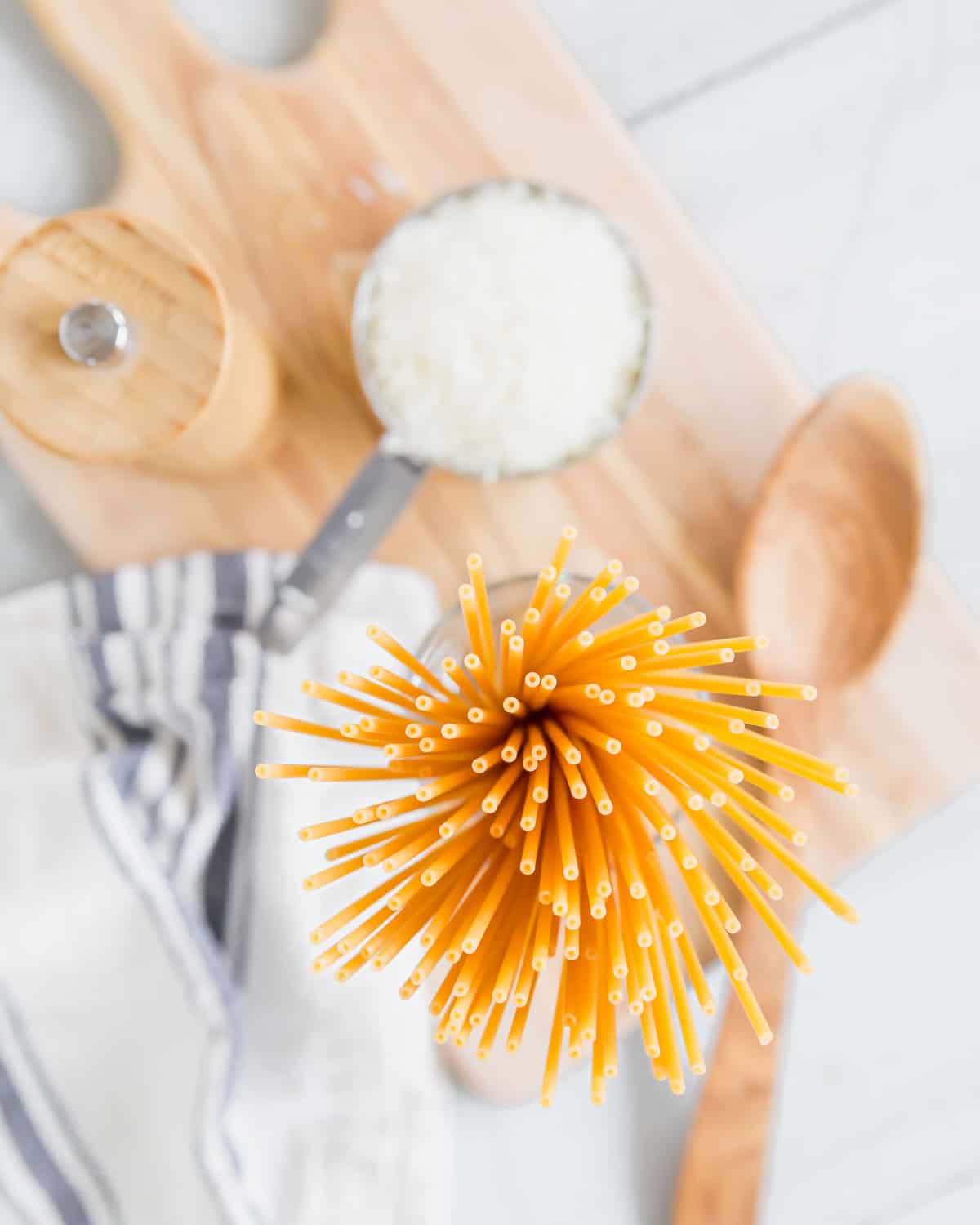
Ingredients needed for bucatini cacio e pepe
This creamy pasta dish doesn’t require much but when a recipe is only five ingredients, quality does matter so choose the best you can find of each ingredient.
Look for European grass-fed butter, grate your own cheese, grind your own pepper and make sure the olive oil is cold-pressed and single source. Even better if it’s Italian sourced.
What you’ll need for this dish:
- bucatini
- extra virgin olive oil
- freshly ground black pepper
- butter
- Pecorino Romano cheese
Bucatini – the pasta can be wheat-based or a gluten-free brand. I used Banza’s chickpea bucatini which is almost identical in texture to traditional bucatini.
Pecorino Romano – this is a hard, salty sheep’s milk cheese similar in nature to parmesan. It has a shorter aging time than parmesan that contributes to its more earthy and grassy flavor. It’s one of the oldest Italian cheeses and used in many ancient Roman dishes. I personally prefer it to parmesan and use it in other traditional dishes like escarole soup or topping lamb bolognese.
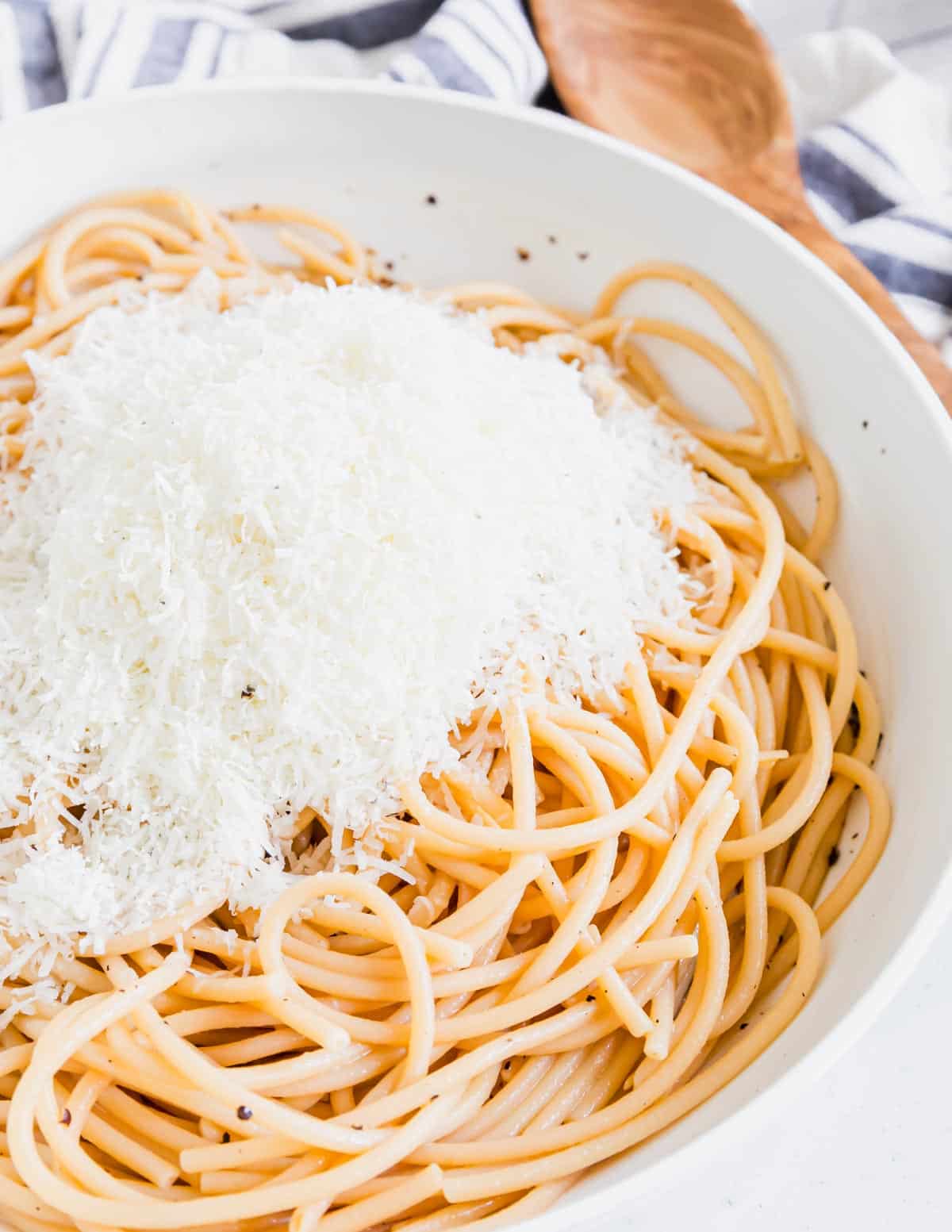
How to make cacio e pepe with bucatini
Unlike most pasta dishes that call for a large pot of water, cacio e pepe actually relies on starchy pasta water for the dish.
For that reason, the recipe starts by bringing a small amount of water (it’s one time where you can ignore the perfect pasta rules) to a boil in a small to medium sauce pot or skillet with sides. Once boiling, salt the water generously and add the bucatini. Cook until al dente — about one to two minutes under the stated cooking time.
While the bucatini cooks, start the cacio e pepe sauce.
In a large skillet, add the olive oil and pepper over medium heat. Bring to a low simmer and let cook until fragrant, about one to two minutes.
Add the butter and half a cup of the cooking water from the pasta to the skillet and whisk to combine.
Once the pasta is cooked, drain, reserving another cup of the cooking liquid and add the pasta to the skillet.
Top the pasta in the skillet with the freshly grated Pecorino Romano cheese and toss together until well combined. Add the reserved pasta water a little at a time until the bucatini is coated in a creamy sauce.
Serve immediately with more freshly ground black pepper and grated cheese if desired.
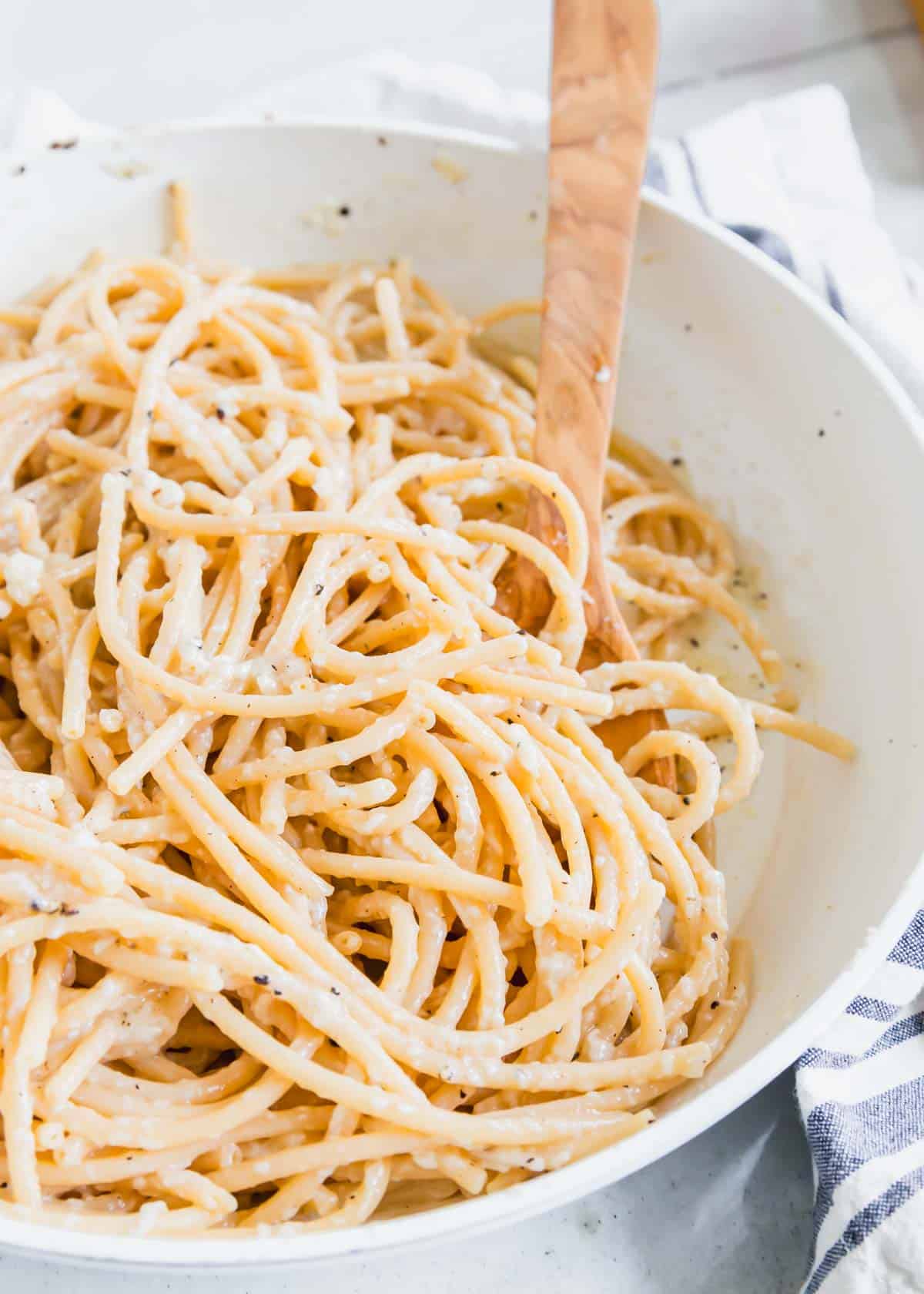
What does cacio e pepe mean?
The literal translation from Italian is “cheese and pepper” for the Pecorino Romano cheese and fresh ground black pepper the dish is made of.
Can I use a different type of pasta?
Bucatini is a fun shape and when I can find it, I prefer it to linguine or spaghetti. It can be dyed with red wine for a stunning dish or used in an easy 30-minute meal like this bucatini with garlic shrimp. That said, feel free to swap out any thin long noodle shape for it if you prefer.
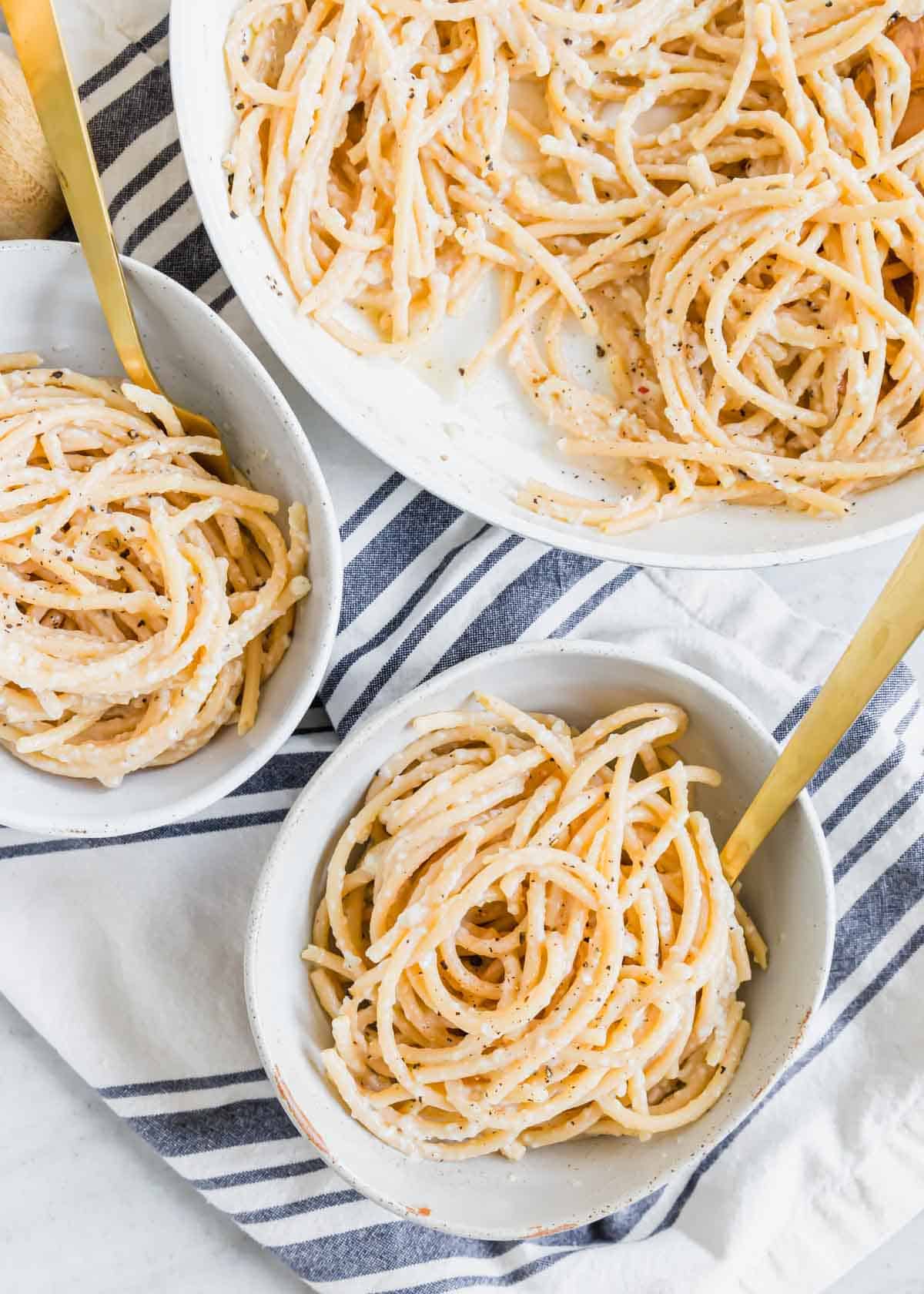
How to serve this bucatini cacio e pepe recipe
This is the kind of meal that’s perfect for busy nights when there’s nothing in the fridge. With just five simple ingredients, it gets the job done in a delicious way. I consider it a go-to pantry pasta that keeps good company with recipes like this ground beef pasta skillet and lighter spaghetti Alfredo.
Serve it simply with a green salad, a simple roasted vegetable, some sautéed beet greens or a more classic Italian pairing like Utica greens which use escarole.
You can also add frozen peas or sautéed mushrooms (like this creamy vegan risotto) to the pasta to bulk up the dish a bit and round out the meal.
The pasta can also be used as a side dish and makes a great accompaniment to another classic Italian dish like chicken sorrentino.
Storing leftovers
This is a dish that’s best enjoyed fresh. The sauce is creamiest when first made but it will store in the refrigerator as well.
Transfer any leftovers to an air-tight container and keep refrigerated for up to 5 days.
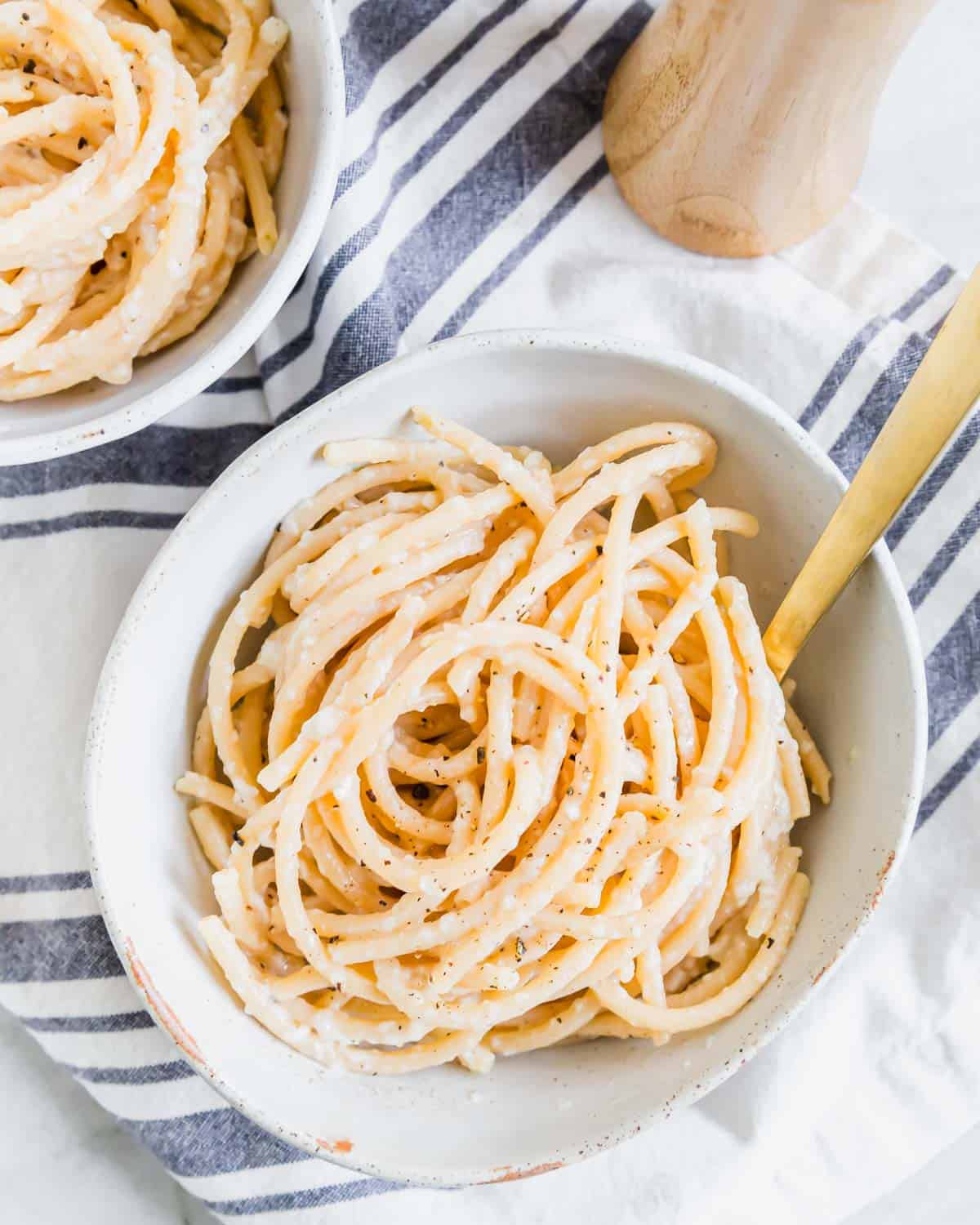
Why you’ll love this recipe
- 20-minute meal
- Majorly indulgent
- Simple ingredients
- Crowd-pleaser
This ancient Roman pasta dish is sure to delight everyone at the table and couldn’t be easier to make. It’s wonderfully creamy without the guilt of other decadent dishes and will shock you with its mouthwatering lusciousness.
Try this creamy tomato farfalle and lemon ricotta pasta for more easy pasta recipes like this one.
Bucatini Cacio e Pepe
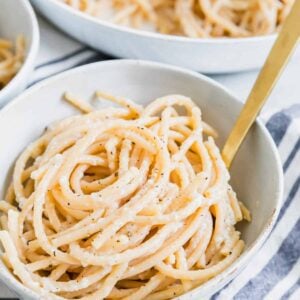
Ingredients
- 8 ounces bucatini, use gluten free brand if desired
- 3 tablespoons extra virgin olive oil, divided
- 1 teaspoon freshly ground black pepper, plus more for serving
- 2 tablespoons unsalted butter
- 1 heaping cup finely grated Pecorino Romano cheese, 70g
Instructions
- Bring a small to medium pot of water to a boil. Salt once boiling then add the bucatini and cook until al dente — about 1-2 minutes under stated cooking time.
- Meanwhile, place 2 tablespoons of the olive oil in a large skillet over medium heat with the black pepper. Simmer for 1-2 minutes until fragrant.
- Add 1/2 cup of the cooking liquid from the pasta to the skillet along with the butter. Let the butter melt and gently whisk the mixture together.
- Strain pasta, reserving an extra cup of the pasta water, then add it to the skillet.
- Add the grated cheese on top and toss everything together until well combined and creamy adding more pasta cooking liquid if desired to reach your preferred consistency.
- Serve with extra ground pepper.
Notes
Nutrition
Nutrition information is automatically calculated, so should only be used as an approximation.
Watch the web story — Quick & Easy Cacio e Pepe.
Gina Matsoukas is an AP syndicated writer. She is the founder, photographer and recipe developer of Running to the Kitchen — a food website focused on providing healthy, wholesome recipes using fresh and seasonal ingredients. Her work has been featured in numerous media outlets both digital and print, including MSN, Huffington post, Buzzfeed, Women’s Health and Food Network.

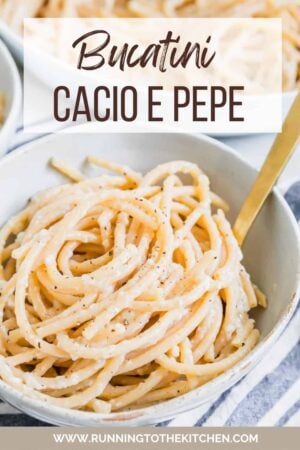
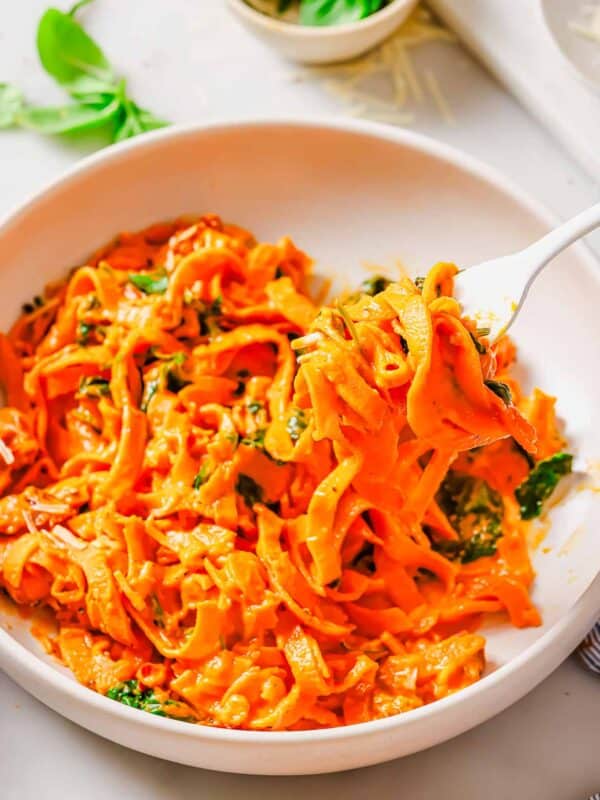

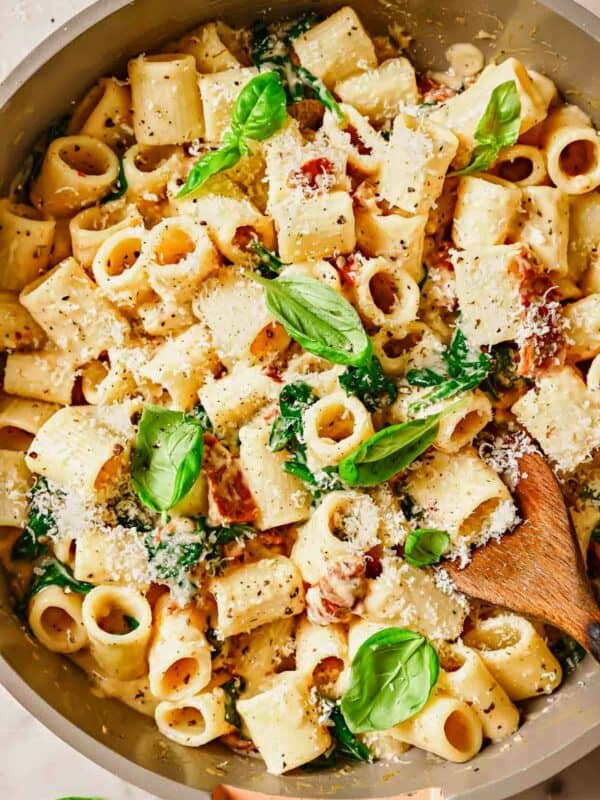
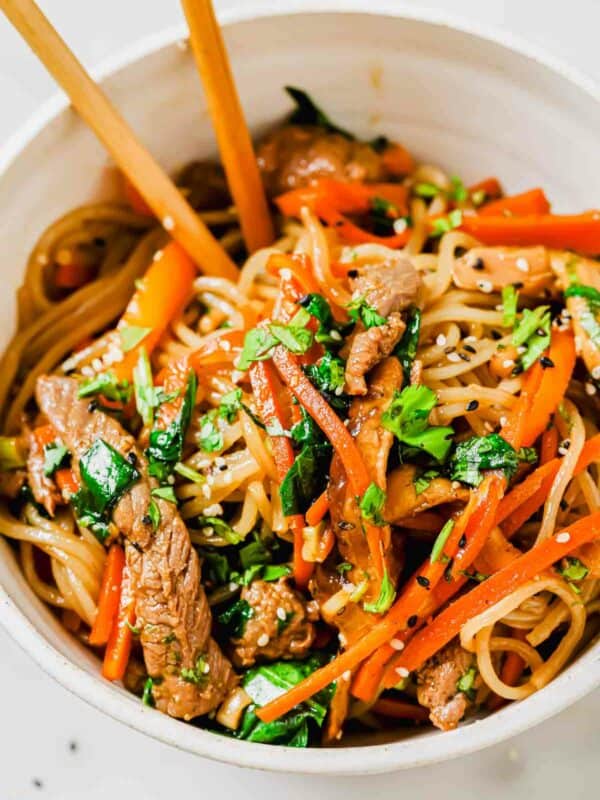








Second try was a charm. Appreciate the well written detailed instructions. Method as well as ingredients is essential.
Loved this recipe for cacio e pepe using bucatini – the texture and flavorful was wonderful!
This dish is so decadent yet so inexpensive to make. Our family loved every bite.